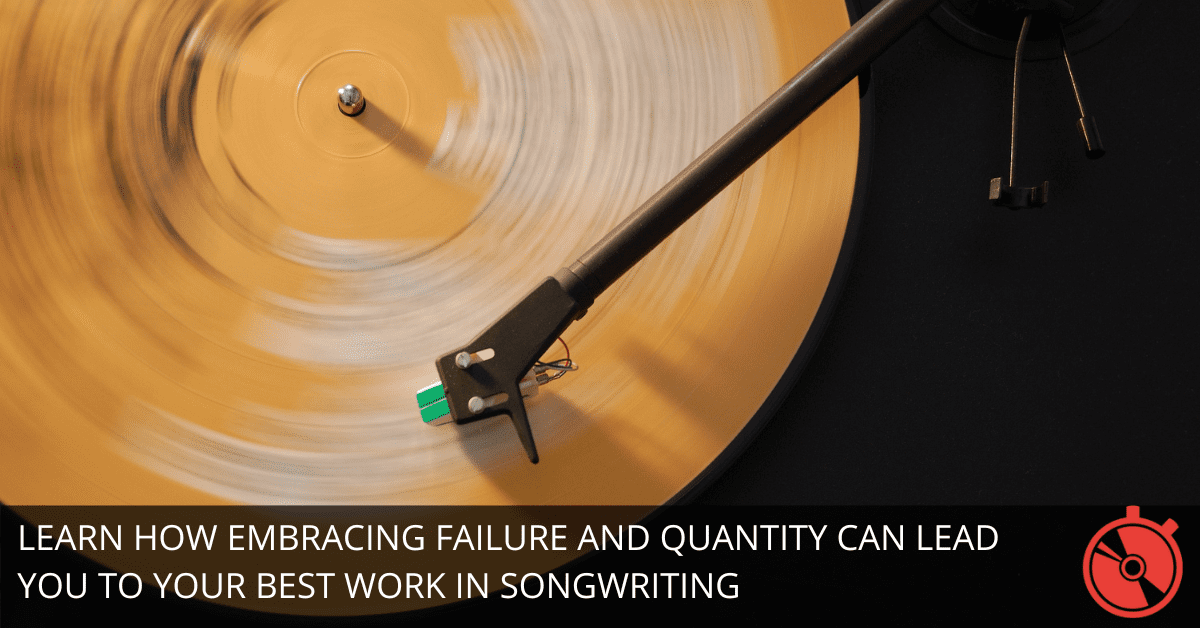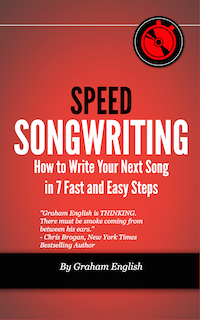
Songwriting can feel like a game of luck sometimes.
You write and write, but only a few songs seem to hit the mark. This can be incredibly frustrating—until you realize this is exactly how it’s supposed to work.
The secret lies in embracing failure and recognizing the power of the 80/20 Rule.
The idea is simple: 80% of your output might be forgettable, but the 20% that shines makes it all worth it. Instead of fearing the "bad" songs, lean into them as part of the process.
Let’s break this down and explore how to use the 80/20 Rule to write better songs.
Stop Expecting Every Song to Be a Hit
The biggest mistake songwriters make is believing every song needs to be a masterpiece.
Here’s the truth: most songs you write will be mediocre. They might be uninspired, repetitive, or just plain bad. But that’s okay.
Think of songwriting like mining for gold. You’ll sift through a lot of dirt before you find a nugget.
Out of every ten songs you write, eight will be the dirt—the ones you probably won’t play for anyone. But the remaining two? That’s your gold. And those golden songs only exist because you dug through the dirt first.
Embrace the Process of Writing "Bad" Songs
Now that you understand not every song will be great, you need to actively embrace the process of writing bad songs.
The more songs you write, the more chances you have to uncover those hidden gems. Don’t sit and wait for inspiration to strike. Instead, push yourself to write consistently, even when the ideas feel weak.
Here’s how to get started: set a weekly goal to write two songs. One of them might be good, and the other might be a total flop.
The key is that you’re building the muscle of consistency. Think of it like a workout routine: some days are better than others, but every session strengthens you.
The Role of Failure in Creativity
Failure isn’t the opposite of success. It’s part of it.
When you write a song that doesn’t work, you’re learning what not to do. Every misstep gets you closer to understanding your style, refining your technique, and discovering what resonates with you and your audience.
For example, let’s say you write a ballad that completely misses the mark. Maybe the chorus is weak, or the lyrics feel flat. Instead of trashing it, ask yourself: what did work in this song? Maybe the verse had a nice melodic structure, or the hook was catchy but needed more energy. Take those lessons forward into your next song.
How to Apply the 80/20 Rule to Your Songwriting Routine
Now, let’s make this practical. To get the most out of the 80/20 Rule, you need a system for generating and refining ideas.
Here are three steps to put this into action:
- Write Consistently: Commit to writing three songs per week. Don’t overthink the quality—just get them down. Some will be rough, but keep going.
- Review and Refine: At the end of each week, revisit your songs. Pick the strongest one, and then identify two specific areas that can be improved. Maybe the verse melody needs more variation, or the bridge could use more energy. Then, refine it.
- Shelve and Revisit: Don’t throw away your bad songs! Set them aside for later. In a few months, come back with fresh eyes. You might find that a weak song has a great hook or a lyric you can repurpose into something new.
Quantity Breeds Quality
A surprising result of embracing failure is that you’ll actually increase your overall quality.
When you stop obsessing over making every song perfect, you give yourself permission to experiment. That experimentation is where true creativity happens.
Let’s take a famous example: Prince reportedly wrote thousands of songs during his career, many of which never saw the light of day. He didn’t rely on just one good idea. Instead, he kept creating, knowing that eventually, those 20% masterpieces would emerge.
The more songs you write, the more you’ll increase your chances of writing a great one. So, aim for volume. Push out ideas quickly. You’ll naturally improve as you build your catalog.
How to Know Which Songs Are in the 20%
So, how do you identify which songs are the “good” ones?
Sometimes, it’s obvious—a melody clicks, or a lyric feels just right. Other times, it’s harder to tell, especially when you’re too close to the work.
Here’s a practical method: record all your songs, even the bad ones. Let them sit for a week or two before listening again. With some distance, it’s easier to assess which ones stand out. If a song still feels exciting after you’ve had time away, it’s likely part of your 20%.
Additionally, get feedback from trusted sources—other songwriters, friends, or musicians. Sometimes, you might miss the potential in a song, but someone else can hear the magic.
Learning From Your 80%
While 80% of your output may not be usable, that doesn’t mean it’s useless. There’s always something to learn from those "failed" songs. Each misstep provides information.
Maybe one song flopped because the hook wasn’t strong enough. Maybe another song got too complicated lyrically. Every time you analyze what went wrong, you get better at spotting potential problems early on.
A good exercise is to look at your 80% songs and write down two things you can improve next time. Over time, you’ll start to notice patterns in your writing—areas that consistently need work. This is how you refine your craft.
Build a Songwriting Archive
Here’s another benefit of writing so many songs: you’re building an archive of ideas.
Just because a song didn’t work today doesn’t mean it won’t work tomorrow. Many famous songs started as ideas shelved for months or even years before they were reworked into hits.
Create a folder (physical or digital) where you store all your unfinished songs, bad drafts, and random lyrics. When you’re stuck on a new song, dive into this archive. You’ll be surprised how often a forgotten line or melody can spark something new.
Don’t Let Perfection Hold You Back
Perfectionism is the enemy of progress. If you’re constantly editing and second-guessing your work, you’ll never produce anything. The 80/20 Rule is a reminder that not everything needs to be perfect.
Next time you sit down to write, challenge yourself to finish a song in one session—even if it’s rough. Set a timer for 30 minutes and just write. Don’t worry about rhymes or whether it “sounds right.” The goal is to get something down. You can always refine it later.
Conclusion: Fail Fast, Fail Often, and Keep Writing
If you want to write better songs, you need to fail faster and fail more often.
The more songs you churn out, the higher your chances of uncovering the 20% that shine. Embrace the process, write those bad songs, and trust that the hits will follow.
The 80/20 Rule isn’t just a theory—it’s a practical strategy for becoming a prolific, confident songwriter.
Keep writing, keep learning, and most importantly, keep failing. That’s where the magic happens.

Enter your first name and email address below and click “GET ACCESS NOW!” to get the Speed Songwriting Cheat Sheet delivered to your inbox!
We guarantee 100% privacy. Your information will not be shared.

Very good! The quality over quantity theory does not apply here. I like the dicking for gold analogy. Later on after we have written a significant quantity of songs we can narrow it down to quality.
Digging not dicking sorry.
lol great typo! Thanks for the comment. 🙂